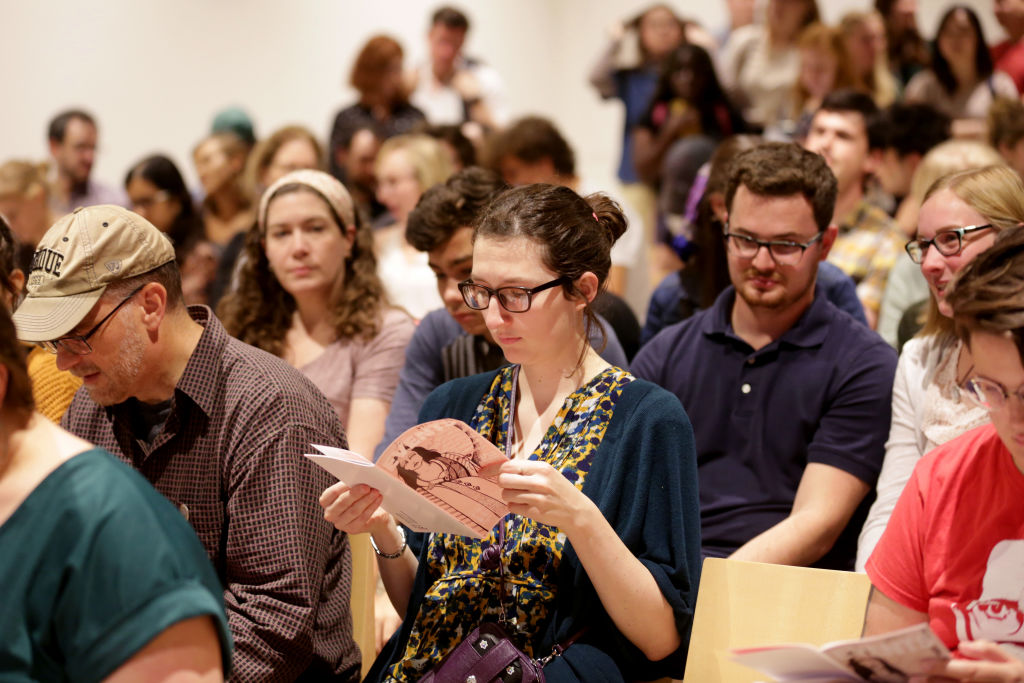In late spring, when every corporation and nonprofit in America was releasing statements about how racism is bad, the Poetry Foundation joined in the chorus of self-preservation. On June 3, it released a statement announcing that it stands ‘in solidarity with the Black community’ and denounces ‘injustice and systemic racism’.It continued: ‘We believe in the strength and power of poetry to uplift in times of despair, and to empower and amplify the voices of this time, this moment.’ Imagine some poor foundation employee posting that statement to their website and wiping his brow. Crisis averted. It took all of three days for social justice campaigners to respond in a fury. In an open letter written by poets and signed by 1,800 writers, subscribers, and multiple ‘former subscribers’, they fumed that the foundation’s ‘watery vagaries’ were worse than meaningless. They were ‘a violence’.
You might think the petitioners would save the word ‘violence’ for, say, police brutality — ‘state-sanctioned murders of Black people by police and the current wave of violent state repression of those protesting’, as they put it in the letter. Instead, they used it to excoriate the progressives who were trying to be on these agitators’ own side. Then again, we’ve been told time after time this year that ‘words are violence’. Anything can be violent, really, as long as the harm it supposedly produces is an expedient political tool.
Given the number of petitions circulating this year to correct the injustices of the world — from the quirky branding at Trader Joe’s to the Thomas Jefferson statue at the University of Missouri — you’d be excused for considering this letter a mere exercise in virtue-signaling. But the authors and signatories weren’t just after more diversity training. Hinting at what was to come, they wrote, ‘For years, your constituents have been calling on the Foundation to redistribute more of its enormous resources to marginalized artists…’
The foundation was started in 2003 with a $200 million gift from philanthropist Ruth Lilly, descendant of the pharmaceutical magnate Eli. Until now, its main function has been to publish Poetry magazine, support poets and encourage the reading and writing of poetry in its native Chicago and beyond. But why stop there?
The petitioners’ five demands included not just the ousting of the president and the board chairman, but ‘a significantly greater allocation of financial resources toward work which is explicitly anti-racist in nature’. This isn’t just about publishing more artists of color, for instance, though that would be a reasonable and timely request. No, this is about strong-arming the Poetry Foundation into shelling out its now-$250 million endowment to whatever progressive causes these angry writers may choose.
Rather than lose the support of these unhappy few, the Poetry Foundation quickly rolled over. Less than a week later (an artificial deadline for response set by the letter-writers), it committed nearly 1,000 words to responding to this list of demands. (This, after both the president and the board chairman resigned, of their own volition, of course.) The foundation promised to unleash $1 million over the next two years, some to artists and some to ‘organizations fighting for social justice, and working to advance racial equity in poetry and affiliated art.’
Nowhere did the foundation give any indication that it thought the petitioners’ demands were unreasonable, overly dramatic, or conveniently self-serving. That might open it up to criticism from these petitioners, or another set of petitioners, leading to infinite clusters of angry poets. That might lead to bad publicity from some fringe leftist outlets, which could put the Poetry Foundation in the awkward position of having upset some capricious and incoherent people. This is a chance it wasn’t willing to take.
In November, it followed up with another statement, explaining that it had already shelled out $500,000 to relief funds for artists affected by the pandemic. (Nothing too crazy about that, though not all of the artists were poets.) For 2021, the Poetry Foundation promises to reevaluate its grant-making with an ‘equity focus’. Gone are the days when a group looking for grant money would craft a grant request, lobby the foundation on the merits of its cause and hope that its earnest petition would meet friendly ears.
Now, if you want to ensure results, you can berate your potential benefactors for not giving you the money sooner, and demand that they distribute it now, lest they be labeled tools of white supremacy.
[special_offer]
This isn’t just a problem at the Poetry Foundation. This summer, calls to dismantle white supremacist systems of oppression (or become ‘proactively antiracist’, as they say at the foundation) swept through arts organizations across the US. A letter to the Virginia Museum of Fine Arts, for example, argued that museums ‘have a moral imperative to engage in reparations’. What does that mean? The museum’s administration ‘must actively and continuously donate to and create sustained partnerships with numerous local BIPOC run organizations’.Nonprofits in the arts increasingly find themselves at odds with their more radical constituents. The question they must answer is: will they submit to the demands of a small group of agitators, handing over their funds to whatever cause keeps them ‘on the right side of history’? Or will they have the backbone to stick to their missions, ignoring the latest grievances in favor of a more long-term goal? Unfortunately, the latter is becoming rarer every day.


















